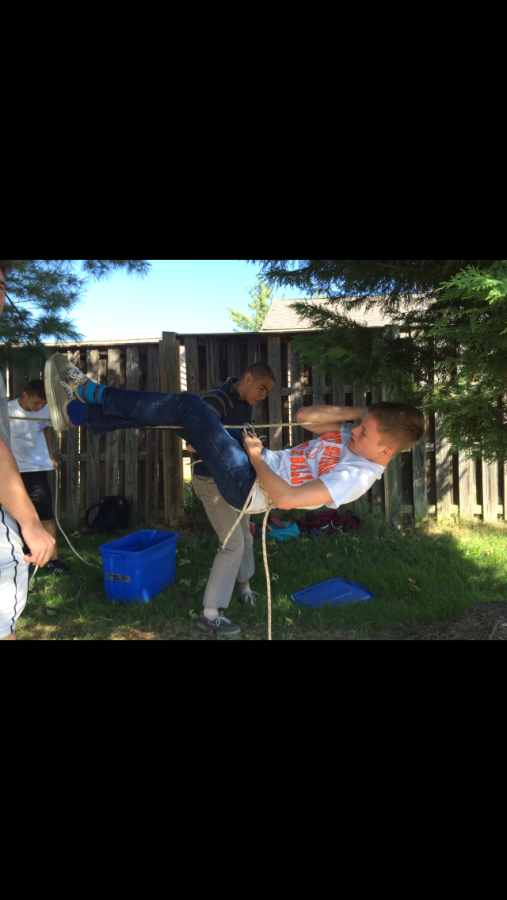JROTC offers a unique experience for students
October 30, 2014
As you walk around the school you most likely see students in uniforms pass by. However, what you may not know is who they are, and what they do. These students are Junior Reserve Officers.
The Junior Reserve Officer’s Training Corps (JROTC) is an Academy Class which offers juniors and seniors the opportunity to receive military training. Cadets learn about the functions of each branch of the military and practice basic training skills, which can give them an advantage if they choose to join a Reserve Officers’ Training Corps program in college or join the military.
The class is both experiential and lesson based. Each day the class is divided, some students sit inside to listen to a lecture while others head outside for a more hands-on lesson on military techniques such as how to perform a one-rope bridge.
“Junior Reserve Officers’ Training Corps’ mission is to develop citizens of character dedicated to serving their nation and community,” JROTC instructor Chief Master Sergeant Al Clemmons said. “The curriculum integrates aerospace science and leadership education into daily life.”
The course is co-taught by Clemmons and another experienced instructor, Lieutenant Colonel Tim Lambert. Clemmons is an aerospace science instructor and a retired Chief Master Sergeant of the United States Air Force, in which he served for 30 years. Lambert is a retired Lieutenant Colonel of the United States Air Force. They work as a team to train 150 cadets from all over Fairfax County.
“I am delighted to spend my retirement years educating and training America’s sons and daughters in their high school years,” Clemmons said.
Clemmons and Lambert teach important lessons while also keeping students active.
“[The instructors] really are engaged in their lessons and take their time to get to know each and every individual cadet,” senior Kelly Chung said.
Cadets learn basic drill and ceremony skills such as marching and formation movements. They also participate in different physical activities such as football, ultimate frisbee, soccer and hockey. There is a strong emphasis on written and oral communication skills, which improves their leadership abilities.
“Our class is very experientially-based,” Clemmons said. “We find that we can build more self-efficacious, lifelong learners if our cadets share a common experience.”
JROTC is not limited to preparing cadets with skills solely for the military. The skills learned can be used in any field. JROTC places emphasis is on servant leaders, people who want to serve others and not themselves.
“Our program prepares cadets for any walk of life,” Clemmons said. “Since the curriculum focuses on the ‘whole’ person, our cadets develop a strong foundation that will serve them regardless of career choice.”
Cadets are offered a variety of leadership opportunities throughout the course, which can help them on college applications and in life after high school, whether they join the military or not.
“Last year, I was Information Officer. This year, I am the Color Guard Commander, which means I pretty much control and organize all the color guards,” Chung said. “I am also the Vice Raider Commander, which means I am in charge of our advanced physical fitness team.”
The JROTC program also places an emphasis on competitive events. The raider team goes to multiple competitions throughout the year to showcase their abilities. Each competition highlights different skills needed for the military at different difficulties. Competitions are based on physical fitness and teamwork and include strength building exercises, obstacle courses and military drills.
On Oct. 18, the team won many awards at the GMU Herndon Field Meet and the Massanutten Military Academy Competition. The team placed first place overall at the Massanutten competition against 20 other teams and won third for the push up competition at the Herndon Field Meet.
The course is especially beneficial to cadets who plan on joining the ROTC program in college. Cadets also make helpful connections with other ROTC officers throughout the state. In addition, they have the chance to gain higher pay grades as enlisted members or gain entrance into other collegiate programs.
“[JROTC is open to] anyone interested in being challenged to grow and learn,” Clemmons said. “The key characteristics we desire is a strong, positive attitude and a willingness to work hard. If you have those, then we have a home for you.”


